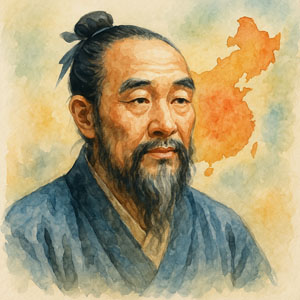— Chuang Tzu

Philosopher Chuang Tzu (Zhuangzi) taught at a time when China wrestled with social chaos and political unrest. Unlike Confucius, who emphasized rulers trained in virtue, Chuang Tzu turned toward the inner path: individual freedom and harmony with the Tao.
Change your mind to change your world, he taught. “I’d rather play in the mud than be harnessed to a ruler.” His humor and paradoxes loosened rigid views so the heart could see clearly.
With his predecessor Lao Tzu, he helped shape Taoist philosophy of yin and yang — two forces that underlie the universe, opposite yet held in delicate balance. Each contains a seed of the other: night carries the glint of stars; the hill has a bright side and a shadowed side.
“When there is no more separation between ‘this’ and ‘that,’ it is called the still point of the Tao,” he said. At the center, we glimpse the infinite in all things.
For Chuang Tzu, the meaning of life could not be captured by labels or judgment. “We cling to our own point of view, as though everything depended on it. Yet our opinions have no permanence; like autumn and winter, they gradually pass away.”

 Have the
Have the